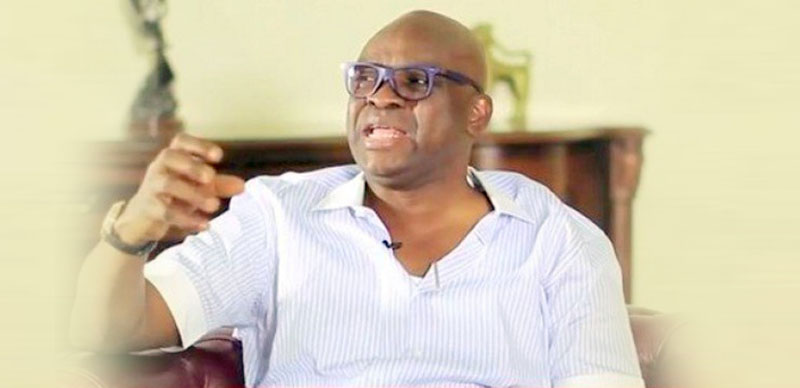Paragraph 1: The Acquittal and Initial Reactions
Former Ekiti State Governor, Ayodele Fayose, experienced a wave of relief and jubilation on Wednesday as a Federal High Court in Lagos discharged him of all charges in a N6.9 billion fraud case. Overcome with emotion, Fayose knelt outside the courtroom, offering thanks in a moment of personal vindication. The scene was one of celebration as supporters rallied around the former governor, who openly wept and embraced his legal team. The palpable joy extended to the counsel for Spotless Investment Limited, Olalekan Ojo (SAN), who had played a key role in securing the acquittal through a successful no-case submission. Fayose’s unrestrained joy manifested in spontaneous song, chanting “Winner ooo, winner!” as he departed the courthouse.
Paragraph 2: The Allegations and the Prosecution’s Case
The Economic and Financial Crimes Commission (EFCC) had accused Fayose and his company, Spotless Investment Limited, of laundering N6.9 billion during his governorship between 2014 and 2018. The charges included allegations of using N1.2 billion for his 2014 election campaign and receiving $5 million in cash from then-Minister of State for Defence, Musiliu Obanikoro, bypassing financial institutions. The EFCC further alleged that Fayose laundered over N1.6 billion through proxies and companies like De Privateer Ltd and Still Earth Ltd, contravening the Money Laundering (Prohibition) Act, 2011. The case, initially filed in 2018, spanned nearly seven years and involved complex financial transactions and witness testimonies.
Paragraph 3: The Defense’s Arguments and Strategy
Fayose’s lead counsel, Kanu Agabi (SAN), argued vehemently for the dismissal of the charges, asserting the prosecution’s failure to present concrete evidence linking Fayose to any criminal activity. A key point of contention was the absence of Abiodun Agbele, allegedly involved in the transactions, from the charge sheet. Agabi challenged the conspiracy charges, highlighting the necessity of implicating a second party. Olalekan Ojo (SAN), representing Spotless Investment Limited, echoed these arguments, bolstering the no-case submission. The defense strategy centered on highlighting the perceived weaknesses and gaps in the EFCC’s case, emphasizing the lack of direct evidence implicating Fayose.
Paragraph 4: The Prosecution’s Rebuttal and Key Evidence
EFCC counsel, Rotimi Jacobs (SAN), countered the defense’s submissions, urging the court to consider their counter-affidavit and written address. Jacobs pointed to Fayose’s avoidance of using his personal accounts for the transactions as suspicious and requiring explanation, posing the question, “If the money was clean, why didn’t he acquire the properties in his name?” The prosecution emphasized the testimony of EFCC investigator Abubakar Madaki, who claimed Fayose used associates to purchase properties, associates who later denied ownership, while Fayose himself claimed these properties. Furthermore, Jacobs highlighted Obanikoro’s testimony, alleging Fayose personally requested the funds in cash and designated Agbele to manage the delivery.
Paragraph 5: The Court’s Ruling and Justification
Despite the extensive arguments and evidence presented by both sides, Justice Chukwujekwu Aneke ruled in favor of Fayose and Spotless Investment Limited. The court upheld the no-case submission, asserting that the EFCC had not established a prima facie case against the defendants. This meant that the prosecution had not presented sufficient evidence to require the defendants to mount a defense. The judge ultimately discharged and acquitted both Fayose and his company, bringing an end to the protracted legal battle.
Paragraph 6: Aftermath and Future Implications
The EFCC, however, expressed its dissatisfaction with the verdict and announced its intention to appeal. Rotimi Jacobs (SAN) confirmed the commission’s plans to obtain a certified copy of the judgment and initiate the appeal process. The EFCC further released a statement reiterating its commitment to pursuing the case further and expressing its disagreement with the court’s decision. This sets the stage for a continued legal battle, leaving the final determination of Fayose’s fate in the hands of a higher court.














